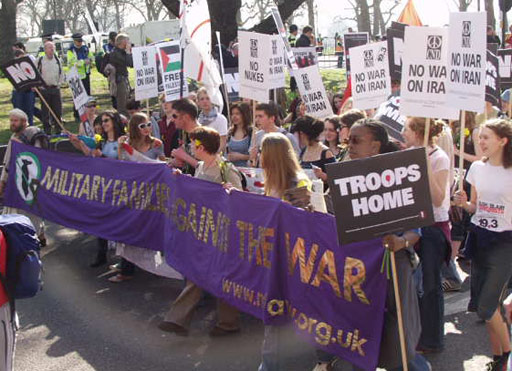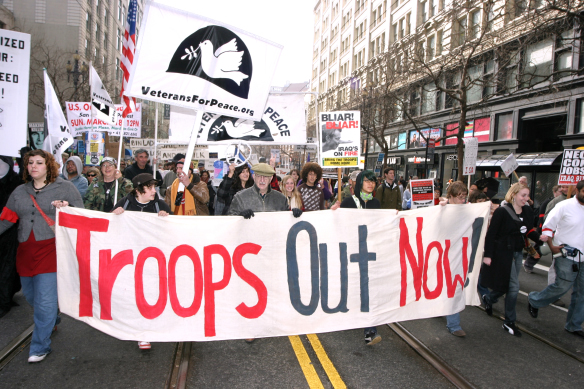 Last week, thousands of flood victims joined a march called by Tewksbury Council. The government has now provided a £6.2 million recovery package for England.
Last week, thousands of flood victims joined a march called by Tewksbury Council. The government has now provided a £6.2 million recovery package for England. In Wales, the New Labour/Plaid coalition has yet to provide any help for the forgotten Welsh flood victms.
Adam Johannes from Roath RESPECT argues that climate change activists and socialists in Wales need to fight for the Assembly government to intervene as part of the struggle for a very different kind of society.
Nye Bevan famously said that "socialism is the language of priorities". If this is the case, then the New Labour/Plaid Cymru coalition that mis-run the Welsh Assembly are very far from socialism.
In the Vale of Glamorgan, £16 billion is being spent - not on schools, hospitals, socially useful jobs, or to eliminate child poverty - but rather to oil the wheels of the British war machine.
The priorities of the two ruling parties in Wales are clear: Billions can be found to set up a Military Academy to train the latest recruits to the "war on terror", but not a penny for a flood hit community in the same area: At home and abroad, our rulers wage war on the poor.
We shouldn't be surprised. It's no secret that Rhodri Morgan and George W Bush are the only world leaders that still refuse to take climate change seriously.
Only a few months ago, the First Minister of Wales even suggested that climate change could boost tourism! He rabidly opposes the Assembly setting binding targets to cut carbon emissions and has failed to visit communities in Wales hit by flooding. Perhaps, Mr Morgan should go to Barry and tell the people who have had their homes destroyed by floods that climate change is good for tourism . . .
Climate, Class & Inequality
Climate change will result in increasingly volatile and extreme weather: Heatwaves, floods, droughts can be expected. This will effect everyone - but not equally. We have already seen that the first and worst victims will be poor and working class people.
In New Orleans, the rich whites were evacuated while the poor - black and white - were left to fend for themselves.
In August 2003, a heat wave engulfed Europe. It resulted in 15,000 deaths in France alone. Half of the people who died lived in old people's homes, few of which have air conditioning. The deaths were overwhelmingly poor and working class people.
In our own country, thousands die of hypothermia each winter: More pensioners die in the UK - the 4th richest economy in the world - than in Siberia. The reason they die is because they cannot afford to adequately heat their home. The reason they cannot afford to adequately heat their home is because Labour and the Tories have attacked pensions and dismantled the Welfare State.
No More Oil Wars!
Our pensioners suffer from fuel poverty while our government sends young working class men abroad to kill in a war for oil. In Iraq, the occupied country - a country with the second biggest oil reserves in the Middle East - ordinary people don't have enough fuel for their homes or cars. In Britain, the occupying country, pensioners die because they can't afford fuel to hear their homes. Who, then, is profiting from Iraqi oil?
The mystery is explained when we grasp that the war is about the richest 10% of our population extending their profits and power.
Is it not the same people who make British workers work the longest hours for the worst pay in the Western World who concocted this "war on terror"? Is it not the same corporations, oil companies, and vested interests that lobbied for the war on Iraq that now bribe the US government to block global action on climate change?
Floods - Who will Pay for the Damage?
It is clear that the floods were also the result of government policies of building housing on flood plains, of poor draining, of flood defences cut back because the government cares about profits not people. Yet, in many cases working people are expected to pay for the damage themselves. In Barry, some families whose houses are uninhabitable don't have house insurance.
Behind the TV images lie many untold stories of desperation, wrecked lives, and despair.
Cardiff RESPECT argues that the government must provide grants for all families effected by the floods in Wales and England to rebuild their lives, these grants should be funded by a special windfall tax on Britain's millionaires, but we also recognise that until we build a credible left wing alternative to New Labour and Plaid, we cannot force the government to do anything. So effective solidarity with the flood victims naturally leads to the necessity of creating a mass organisation in England and Wales to deliver it.
Re-nationalise the Water!
It was once assumed that public utilities like water and electricity should be publicly owned by not-for-profit bodies that were democratically accountable, but Thatcher sold our water and electricity to private corporations to make money, and Blair and Brown refused to re-nationalise them.
The pursuit of profits by the rich and powerful often means that they cut corners when it comes to health and safety. In Gloucestershire, the local water company built water treatment works on the edge of a flood plain and had inadequate flood defences.
During the flooding disaster, they announced £300 million profits with shareholders given a special payment of £575 million, yet now they are saying that water bills must be increased to pay for the damage cause by the floods!

So working class people already faced with huge costs due to their communities being destroyed face the burden of increased water charges levied by corporations making record profits!
For the Planet - Against the State
Climate change - itself the bitter fruit of an economic system based on greed not need - is taking place in a world brutally divided between the rich and poor: Capitalism seemlessly transmutes natural distaster into human catastrophe.
Climate change is not just about weather, it is about inequality, how society is organised, housing, pensions and a host of other issues.
And solving climate change is not about "green taxes" and the fake solutions offered by the mainstream parties. It is about re-nationalising the railways and cheap bus-fares to make travelling by car unnessecary. It is about increasing public health by promoting walking and cycling. It is about a massive programme of house insulation that will mean that working class people will save money from lower fuel bills. It is about healthy locally grown food rather than processed food flown from abroad. It is about jobs that are close to where you work so you don't have to commute. It is about city gardens and sustainability. It is about supporting protests like the Climate Camp and the demonstrations called by Campaign against Climate Change, it is about raising the issue of climate chaos in your work-place, community and trade union branch.
RESPECT fights for a rapid transition away from fossil fuels towards renewable energy as a move from war towards peace, but more fundamentally we argue for a break with the neoliberal model of George Bush, Gordon Brown, David Cameron, Menzies Campbell, Ieuan Wyn Jones and Rhodri Morgan. We want to build a world based on the principle of People before Profit!





















